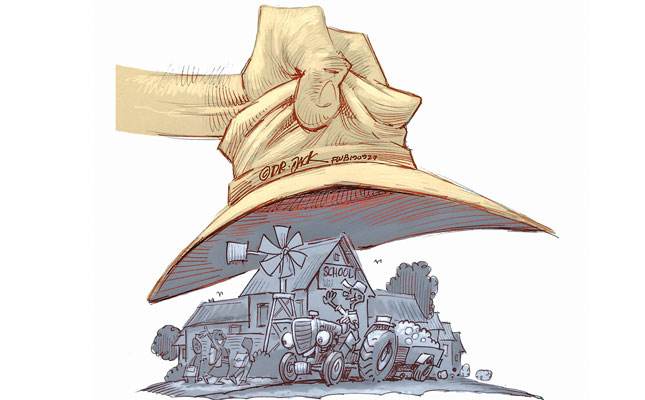
Speaking at the launch of the Bureau for Food and Agricultural Policy’s (BFAP) Baseline Agricultural Outlook for 2019 to 2028, BFAP director Prof Ferdi Meyer said the future of South Africa’s agriculture sector would depend on government and industry making the right policy and investment choices.
According to Meyer, there were four critical policy issues facing the sector:
- Land reform and farmer support, which include policy certainty and property rights;
- Infrastructure and technology, including water infrastructure;
- Increasing local farmers’ access to the major international agricultural markets;
- Developing statistical baseline information to understand activity in South Africa’s agriculture sector in terms of the entrants of small black farms (generally deemed those of about 1ha) and transformation.
What is clear is that, for South Africa’s agriculture sector to transform successfully, a combination of effort and support by both the private and public sector is required.
As Meyer stated, it will take “specific and well-coordinated actions and plans of the public and private sectors, with real capital and people, to drive inclusive agricultural transformation and transfer of land in a just and sustainable way”.
Time for action
There has been little development of significant transformative initiatives in South Africa’s agriculture sector. While it could be argued that lack of policy certainty has put the brakes on the sector’s willingness to invest in transformation initiatives, there are a number of other challenges. These include, but are not limited to, the following:
- An acceleration in the trend towards mega-farmers as the only really sustainable agricultural business model, which could be to the detriment of the larger communities within which they operate;
- Small agri enterprises, whether in primary production or services, facing ongoing challenges to compete or collaborate meaningfully with larger enterprises and remain sustainable;
- The need for scale. Scale gives commercial farmers a competitive advantage by helping them cope better with droughts, floods, market excess and other unpredictable events;
- A limited pool of large, well-known black institutional investors in the agricultural industry to provide a credible voice about what sustainable transformation in the sector should look like;
- Limited opportunities for local communities.
In responding to these challenges, the market tends to hone in on a specific challenge and try to find a solution for it.
For example, a common perception is that, although commercial banks provide support for small-scale black entrepreneurs, this might not lead to broader social and economic sustainability as the support is for smaller projects.
Collectively, there is a need to acknowledge the realities of farming in South Africa and find innovative ways to embrace and leverage the challenges. This will require a substantial mind shift.
When considering strategies to develop farming sustainability, it is doubtful that the notion of ‘profit above all’ will work over the long term. The sector now requires strategies that shift towards broader community inclusion and social value creation.
On a mission for change
In this context, a ‘profit-for-purpose’ model is a compelling alternative. This model broadly refers to businesses that are led by a mission to achieve social, community and environmental benefit through trading, and by channelling a portion of their profit toward this mission.
This is the business model that has been applied in a partnership initiative between family-owned farming enterprise Schoonbee Landgoed and black-owned Thebe Investment Corporation.
It involves commercial production, packaging, marketing and sales of table grapes and citrus in Limpopo.
The initiative, known as Project Change, is grounded in the spirit and principles of the National Development Plan.
It consists of two recently developed farms with existing income, the acquisition of just under 400ha of additional land with recognised water rights for further citrus and grape development, and three primary healthcare and educational facilities for the surrounding communities, which will be deployed by mid-2020.
It is anticipated that more than 1 200 new jobs will be created directly through the initiative, with an estimated impact on 8 000 jobs throughout the value chain. The project is supported by significant Land Bank funding.
The initiative, which is majority black-owned, took two years to develop as a profit-for-purpose concept, with the main imperative being to create an initiative that enables shared value.
The central premise behind this is that the long-term competitiveness of a company and the health of the communities around it are mutually dependent.
According to the partners, shared value, in this case, begins by according dignity to workers and community members involved in the project.
This has been done by addressing three specific social needs: providing employment for people living in the Loskop Valley and surrounds; supporting worker and wider community health by providing primary healthcare facilities and services; and unlocking human capability and breaking the systemic cycle of poverty by providing education and training opportunities to the farm’s workers, their children and budding entrepreneurs in the surrounding communities.
It is important to recognise that the concept does not compromise profitability, but seeks to share the value created in a specific way to address social needs sustainably.
Sustainable transformation
From a business perspective, the initiative will have access to the local and international retail markets serviced by Schoonbee Landgoed. Approximately 70% of Project Change’s output will be earmarked for export to 60 countries.
This project seeks to become a market-leading, black-owned, profit-for-purpose farming initiative that services local and international markets with premium products, while at the same time empowering the communities involved through job creation and the provision of education, training and healthcare services.
The project’s profit-for-purpose model has the potential to provide an innovative, long-term framework for partnerships between established white commercial farmers and black institutional investors, while empowering local communities and supporting new-entrant (including smallholder) farmers to achieve financial viability.
The model is a deliberate shift away from a singular focus on the wealth of shareholders to the long-term health of the company when looking at its well-being through financial, social and environmental perspectives.
Because these aspects are critically interlinked, the agriculture sector’s task is to develop holistic business models where these challenges converge into one practical and workable solution.
Without this, it will be difficult to ensure the broad and sustained transformation that South Africa’s agriculture sector needs.
The views expressed in our weekly opinion piece do not necessarily reflect those of Farmer’s Weekly.
Gert Schoonbee is the co-owner of farming company Schoonbee Landgoed. Email him at [email protected].










